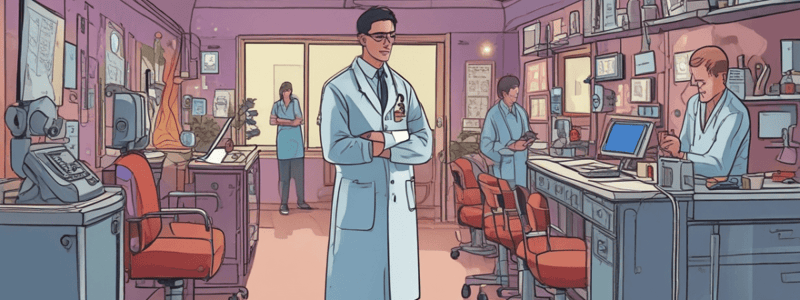Podcast
Questions and Answers
What is communication in the context of phlebotomy?
What is communication in the context of phlebotomy?
The imparting or exchanging of information.
Why is effective communication important in phlebotomy?
Why is effective communication important in phlebotomy?
It is a key component of successful phlebotomy.
What type of vocabulary should a phlebotomist use when communicating with patients?
What type of vocabulary should a phlebotomist use when communicating with patients?
Simple vocabulary, avoiding complex medical terms.
Why is it important to listen carefully and provide feedback when communicating with patients?
Why is it important to listen carefully and provide feedback when communicating with patients?
What is the 'zone of comfort' in the context of phlebotomy?
What is the 'zone of comfort' in the context of phlebotomy?
Why is it important for phlebotomists to be mindful of their appearance and hygiene?
Why is it important for phlebotomists to be mindful of their appearance and hygiene?
What is an important aspect of telephone etiquette in a phlebotomy setting?
What is an important aspect of telephone etiquette in a phlebotomy setting?
What is empathy in the context of healthcare communication?
What is empathy in the context of healthcare communication?
When answering a phone call, what should you do first?
When answering a phone call, what should you do first?
What is the appropriate way to speak when answering a phone call?
What is the appropriate way to speak when answering a phone call?
What should you do before placing a caller on hold?
What should you do before placing a caller on hold?
Why should you avoid using technical language when speaking with a caller?
Why should you avoid using technical language when speaking with a caller?
What should you do when interacting with a patient?
What should you do when interacting with a patient?
What should you do with your personal phone when interacting with a patient?
What should you do with your personal phone when interacting with a patient?
Flashcards are hidden until you start studying
Study Notes
Communication in Phlebotomy
- Communication is the imparting or exchanging of information between the phlebotomist and the patient.
- Phlebotomists interact with many different types of patients, and customers base their perception of the healthcare facility on the employee who deals with them.
Effective Communication Skills
- Effective communication is a key component of successful phlebotomy.
- Prepare the patient adequately before the procedure.
- Use simple vocabulary, avoiding complex medical terms.
- Explain special test requirements clearly, such as semen analysis, GTT, and 24-hour urine collection.
- Listen carefully and provide feedback to the patient.
- Allow patients to ask questions and answer them courteously.
Nonverbal Communication
- Nonverbal communication involves transmission of messages or signals through:
- Eye contact
- Facial expressions
- Gestures
- Posture
- Phlebotomists work in the intimate zone (1-18 inches) to perform venipuncture, and patients are often more aware of the phlebotomist's touch.
Personal Space and Hygiene
- Respect the patient's personal space, with zones of comfort including:
- Intimate (1-18 inches)
- Personal (1 ½ - 4 feet)
- Social (4 – 12 feet)
- Public (more than 12 feet)
- Factors such as hygiene, grooming, appearance, conduct, and clothing are important for phlebotomists to manage well.
Elements of Healthcare Communication
- Empathy
- Control
- Respect and confirmation
- Trust
Telephone Techniques and Etiquette
- Answer incoming calls quickly and politely.
- Use a friendly and professional tone, stating the name of the business or department, your name, and asking how you can assist.
- Speak at an appropriate volume and speed, using non-technical language and avoiding abbreviations and medical jargon.
- Use polite language when placing callers on hold and ask for permission.
- Listen attentively to determine the best way to assist.
- Close calls in a friendly and professional way.
Phlebotomist and Cell Phone Etiquette
- Give 100% attention to the person in front of you.
- Avoid taking personal calls or texting when dealing with a patient.
- Keep your personal phone on silent mode.
Studying That Suits You
Use AI to generate personalized quizzes and flashcards to suit your learning preferences.




